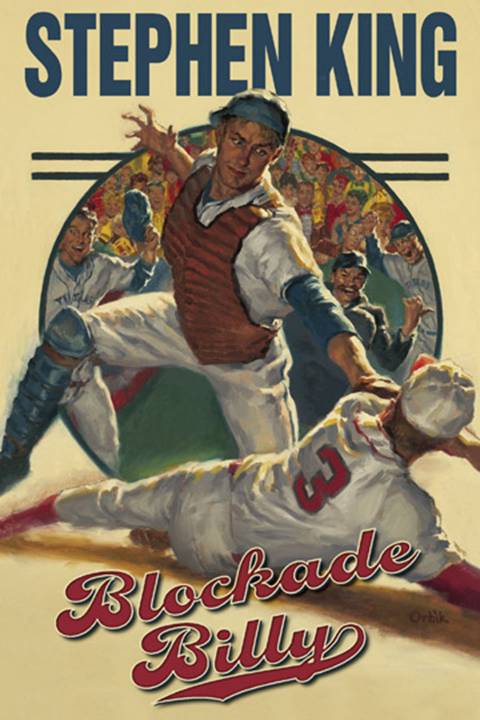baseball is a good thing; always was, always will be
| Blockade Billy |
 |
|
Publication Information
2010
Cemetery Dance/Scribner
120 pages
#9 New York Times Bestseller
Limited Edition Information
- Cemetery Dance Edition
- Illustrated by Glen Orbik
- dust jacket, interior illustrations, and slipcase not included in the Scribner edition
- Also includes limited edition Blockade Billy baseball card
- Lonely Road Books Edition
- Both editions include high quality paper stock, leather binding, two color printing throughout the book, a color frontispiece by Glen Orbik, eleven interior illustrations by Alex McVey, a sewn-in ribbon page marker, a custom deluxe traycase with pullout ribbon, an illustrated signature sheet signed by the artists, and Stephen King's first-ever baseball card signed by King, as well as the Blockade Billy baseball card
- Lettered edition also includes three piece binding featuring a special Japanese book cloth, exclusive artwork page in each book featuring an original sketch by Alex McVey, bonus art portfolio featuring Limited Edition prints of the artwork from the book, and a deluxe hand-made custom box to hold the book and the portfolio
|
A Novel Critique
A simple story, well told.
Blockade Billy tells the tale of William Blakely, perhaps the greatest baseball player ever to put on the gear, and who was summarily erased from the record books and forgotten by the world. King's novella is primarily concerned with the questions raised by these opposing histories: why Blakely was the greatest, and what made him disappear. The answers lie in George Grantham, former third baseman coach and equipment manager for the New Jersey Titans. Grantham - Granny - spins his story of the 1957 season that introduced William Blakely to the big leagues. It's an uninterrupted first-person narrative, the kind King used to great success in Dolores Claiborne, and that success is matched here. Only Granny isn't speaking to fictional, off-screen listeners in Blockade Billy; instead, King cleverly inserts himself as the one taking dictation. While King's presence doesn't intrude (he is only mentioned by name three or four times), it adds a certain verisimilitude to a story one believes actually, tragically, could happen.
Clever, too, is the setup. King tackles old-time baseball the way he tackles prison life in The Green Mile or "Rita Hayworth and Shawshank Redemption," or the way he tackles small towns in 'Salem's Lot or Needful Things: he assumes the reader knows nothing about it, and builds from there. One of the subtle pleasures of Blockade Billy is that readers don't have to be baseball fanatics to love the story; similarly to The Girl Who Loved Tom Gordon, the reader is given just enough information so that one cares about the outcome of the game as much as the characters do. Unlike in Faithful, King does not overwhelm the reader with baseball lore and stats. He is instead concerned with getting you invested in the suspense of what's happening, and why.
That suspense lies at the heart of Blockade Billy. Stephen King has long been a master of the action sequence, those amped-up moments of intensity that make the rest of the story feel like a single held breath. Witness the dog attacks in Cujo, the painting sequences in Duma Key, or the psychic flashes in The Dead Zone. Here, the same treatment is given to Blockade Billy's baseball games ... and what happens when someone on the opposing team goes up against Billy directly. Billy's single-minded devotion to baseball and to his team drives these scenes, spiking in what seems to be inevitable violence. It's not whether the Titans win or lose, it's how Blockade Billy plays the game. And the crowd eats it up.
So many of King's fascinations are on display here, and it's a delight for longtime readers to see them deconstructed and reassembled into this fantastic new book. Blood sport has been central to King's imagination since The Long Walk; even though Blockade Billy focuses on baseball instead of dystopian-future game shows, blood does indeed spill. In his depictions of the crowd's enthrallment with violence, King recalls The Running Man and, again, The Long Walk. A startling scene near the end brings to mind certain scenes in Hearts In Atlantis, and King's ongoing interest in the William Golding book Lord of the Flies. If the technique is reminiscent of Dolores Claiborne, the voice is similar to that of Paul Edgecombe's in The Green Mile, or even the older men describing the central mystery of The Colorado Kid.
In fact, Blockade Billy - whose cover, like that of The Colorado Kid, was painted by the amazing Glen Orbik - almost works as a spiritual cousin to King's Hard Case Crime outing. Though the stories are wildly different, they read the same, and have the same feel. There are two essential differences here, though: first, the mystery of Blockade Billy is never asserted as a mystery. The reader has only just begun asking serious questions about the central character before the truth begins to emerge. And second, the truth does emerge. Unlike the origins of that body on the beach in The Colorado Kid, just where Blockade Billy came from and how he got there are startlingly revealed.
Coming so close on the heels of a mammoth novel like Under the Dome, Blockade Billy is refreshingly slender. It's short enough for a reader to gulp down in one sitting, and compelling enough that he or she is helpless to do anything but. A small masterpiece of voice, pacing, and situation, Blockade Billy once again proves that Stephen King is a master of the novella.
